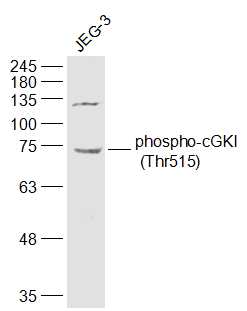
Rabbit Anti-phospho-cGKI (Thr515)antibody
phospho-PKG(Thr515); p-PKG(Thr515); cGKI alpha; CGKI; cGKI beta; cGMP-dependent protein kinase 1; KGPB; pkg; PRKG1; PRKG1B; PRKGR1A; PRKGR1B.
View History [Clear]
Details
Product Name phospho-cGKI (Thr515) Chinese Name 磷酸化cGMP依赖性蛋白激酶1抗体 Alias phospho-PKG(Thr515); p-PKG(Thr515); cGKI alpha; CGKI; cGKI beta; cGMP-dependent protein kinase 1; KGPB; pkg; PRKG1; PRKG1B; PRKGR1A; PRKGR1B. Product Type Phosphorylated anti Research Area Cardiovascular Cell biology Signal transduction Kinases and Phosphatases Immunogen Species Rabbit Clonality Polyclonal React Species Human, (predicted: Mouse, Rat, ) Applications WB=1:500-2000 ELISA=1:5000-10000 IHC-P=1:100-500 IHC-F=1:100-500 ICC=1:100-500 IF=1:100-500 (Paraffin sections need antigen repair)
not yet tested in other applications.
optimal dilutions/concentrations should be determined by the end user.Theoretical molecular weight 74kDa Cellular localization cytoplasmic Form Liquid Concentration 1mg/ml immunogen KLH conjugated Synthesised phosphopeptide derived from human cGKI around the phosphorylation site of Thr515: KK(p-T)WT Lsotype IgG Purification affinity purified by Protein A Buffer Solution 0.01M TBS(pH7.4) with 1% BSA, 0.03% Proclin300 and 50% Glycerol. Storage Shipped at 4℃. Store at -20 °C for one year. Avoid repeated freeze/thaw cycles. Attention This product as supplied is intended for research use only, not for use in human, therapeutic or diagnostic applications. PubMed PubMed Product Detail Protein kinases are enzymes that transfer a phosphate group from a phosphate donor, generally the g phosphate of ATP, onto an acceptor amino acid in a substrate protein. By this basic mechanism, protein kinases mediate most of the signal transduction in eukaryotic cells, regulating cellular metabolism, transcription, cell cycle progression, cytoskeletal rearrangement and cell movement, apoptosis, and differentiation. With more than 500 gene products, the protein kinase family is one of the largest families of proteins in eukaryotes. The family has been classified in 8 major groups based on sequence comparison of their tyrosine (PTK) or serine/threonine (STK) kinase catalytic domains. PKG plays an important stimulatory role in platelet activation.
Function:
Serine/threonine protein kinasethat acts as key mediator of the nitric oxide (NO)/cGMP signaling pathway. GMP binding activates PRKG1, which phosphorylates serines and threonines on many cellular proteins. Numerous protein targets for PRKG1 phosphorylation are implicated in modulating cellular calcium, but the contribution of each of these targets may vary substantially among cell types. Proteins that are phosphorylated by PRKG1 regulate platelet activation and adhesion, smooth muscle contraction, cardiac function, gene expression, feedback of the NO-signaling pathway, and other processes involved in several aspects of the CNS like axon guidance, hippocampal and cerebellar learning, circadian rhythm and nociception. Smoth muscle relaxation is mediated through lowering of intracellular free calcium, by desensitization of contractile proteins to calcium, and by decrease in the contractile state of smooth muscle or in platelet activation. Regulates intracellular calcium levels via several pathways: phosphorylates MRVI1/IRAG and inhibits IP3-induced Ca(2+) release from intracellular stores, phosphorylation of KCNMA1 (BKCa) channels decreases intracellular Ca(2+) levels, which leads to increased opening of this channel. PRKG1 phosphorylates the canonical transient receptor potential channel (TRPC) family which inactivates the associated inward calcium current. Another mode of action of NO/cGMP/PKGI signaling involves PKGI-mediated inactivation of the Ras homolog gene family member A (RhoA). Phosphorylation of RHOA by PRKG1 blocks the action of this protein in myriad processes: regulation of RHOA translocation; decreasing contraction; controlling vesicle trafficking, reduction of myosin light chain phosphorylation resulting in vasorelaxation. Activation of PRKG1 by NO signaling alters also gene expression in a number of tissues. In smooth muscle cells, increased cGMP and PRKG1 activity influence expression of smooth muscle-specific contractile proteins, levels of proteins in the NO/cGMP signaling pathway, down-regulation of the matrix proteins osteopontin and thrombospondin-1 to limit smooth muscle cell migration and phenotype. Regulates vasodilator-stimulated phosphoprotein (VASP) functions in platelets and smooth muscle.
Subcellular Location:
Cytoplasm. Colocalized with TRPC7 in the plasma membrane.
Tissue Specificity:
Primarily expressed in lung and placenta.
Post-translational modifications:
Autophosphorylation increases kinase activity. 65 kDa monomer is produced by proteolytic cleavage.
Similarity:
Belongs to the protein kinase superfamily. AGC Ser/Thr protein kinase family.
cGMP subfamily.
Contains 1 AGC-kinase C-terminal domain.
Contains 2 cyclic nucleotide-binding domains.
Contains 1 protein kinase domain.
SWISS:
Q13976
Gene ID:
5592
Database links:Entrez Gene: 5592 Human
Omim: 176894 Human
SwissProt: Q13976 Human
Unigene: 407535 Human
Product Picture
References (0)
No References
Bought notes(bought amounts latest0)
No one bought this product
User Comment(Total0User Comment Num)
- No comment



 +86 571 56623320
+86 571 56623320
 +86 18668110335
+86 18668110335

